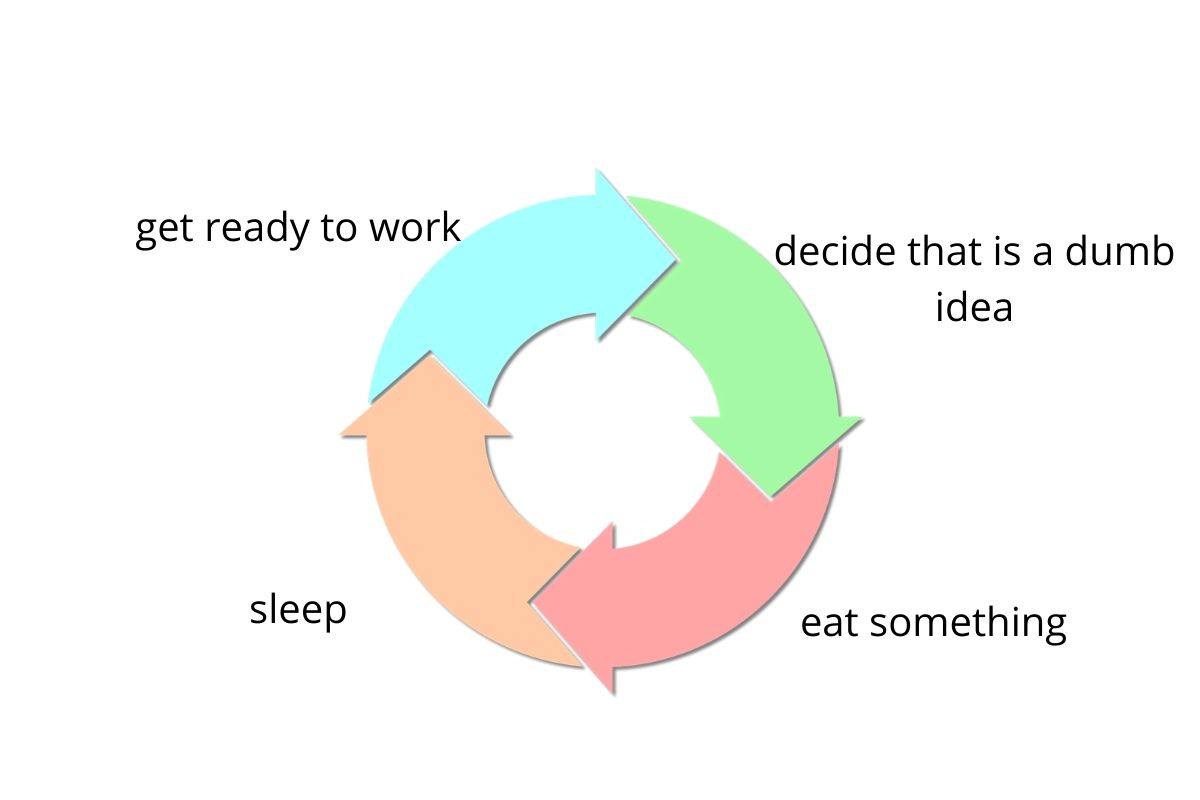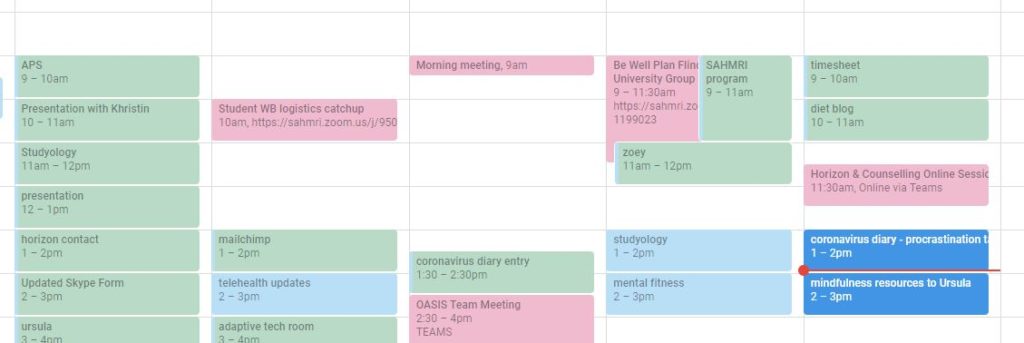
I’ll be blogging my way through the Coronavirus period, with a focus on the psychological impacts and how to keep yourself and the people you care about safe and mentally healthy.
Look after yourself peeps..
Dr Gareth Furber
So I am starting to get into the groove of working from home, at least from a productivity perspective (food is another thing altogether).
There are a few things contributing to this, one of which I have been writing about today as I put together a tackling procrastination course called Studyology which I hope to be delivering online in a few weeks time (stay tuned).
You see, as part of this course, participants will be encouraged (strongly) to do homework exercises that translate what they’ve learned about procrastination, in the sessions, to engaging better with their studies at home.
There are 4 homework exercises in total during the program and they are structured similarly. They go a little bit like this:
- Set a time each day when you will start working on your studies. Preferably make it fairly early (e.g. 9.00am).
- At the designated time, take a seat at the place you are going to study. For me, it is my desk.
- Take a couple of deep breaths.
- First, notice the sensations of sitting – points of pressure, temperature, tingling.
- Second, notice the sounds around you.
- Third, take a moment to look at and note all the things in front of you – e.g. laptop, screen, books, speakers, phone paper etc.
- Notice and give a name to how you are feeling – relaxed, bored, tired, anxious, happy, vague
- Take a moment to try and capture a few of the thoughts going through your head – what pops up in your head when you sit quietly for a while?
- Take a moment to welcome all the thoughts and feelings and sensations that show up and inform them that you are about to start working. Invite them to join you whilst you work.
- Open a diary or calendar or to-do-list and write down at least 3 things that you want to do today. If you aren’t sure what you have to do, you can make that one of the tasks (e.g. note down the due dates of my next assignments). Assign each of the things you want to do to a time of the day. Give yourself 1 hour for each task, that includes the task itself + a break. If you complete a task much quicker than that, you can allocate a new task to that timeslot as well. Try to be specific in how you phrase each tasks. Don’t just write ‘study’, instead write ‘read chapter 3 of …’
- Allocate one of your tasks to right now.
- Start that task.
- The moment that you notice that you are distracted or have moved onto something else, say ‘thanks procrastination, but I need to work on [insert task here]’.
- Return to the task.
- Feel free to repeat this overall process at any time during the day.
This might feel a little artificial and weird, but inherent in this process are a few key ideas for tackling procrastination.
Clear task description and allocation – at the beginning of the day, outline clearly what you want to achieve (tasks) and allocate each task to a specific time of the day. I do this in Google Calendar and then I change the colour of a task once I have completed it.

Present moment awareness – taking a moment to notice the sensations of sitting, the breath, sounds and sights, thoughts and feelings is part of grounding you in the here and now. Otherwise your brain will be happy to keep you distracted with other things. Present moment awareness gets you ready what you need to do right now.
Acceptance of thoughts and feelings – we make all sorts of judgements about how we are thinking and feeling and what this means for us successfully engaging in our work. Usually we find ways of using our thoughts and feelings as excuses not to work (I’m bored, I’m tired, this can wait till tomorrow, I’ve got no motivation). Rather than try to change these sensations, welcome them and invite them to sit alongside whilst you get on with the tasks you need to do. You’ll discover over time that your capacity to work, even when not feeling that great is better than you expected.
Self-compassion – I can pretty much guarantee you that you will procrastinate. You’ll start a task and then get distracted. I’ve been distracted multiple times during the writing of this post. Punishing oneself for distraction is pointless. Simply practice returning to the task at hand, whenever you notice you’ve been distracted. Self-compassion is continuing to act in a way that is in your best interests, whilst being understanding that you will falter along the way.
What can develop over time is a work ritual or routine – a set of practices that you engage in that get you in the right mindset for productivity. You can enhance the process above with some additions:
- make a cup of tea first and then notice the taste of the tea before starting the task
- having a quick conversation with an item on your desk (I speak to the Lego Batman that sits next to me)
- sending a message to a friend that you are about to start studying for the day
You can make the process uniquely yours.
Suggested reading
If you find yourself getting a bit too productivity focused, I liked this article that one of the counsellors sent around about not becoming too focused on productivity as a way of coping with the Coronavirus changes – https://www.chronicle.com/article/Why-You-Should-Ignore-All-That/248366

